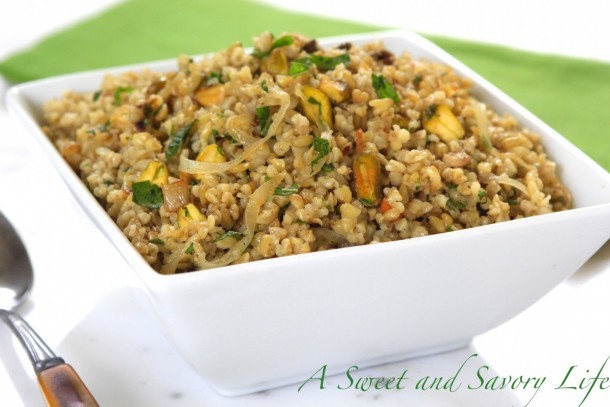Two thousand years ago, during a conflict somewhere in the Middle East (some things never change), someone set fire to someone else’s field of young green wheat. When the villagers returned home, they tried to salvage what they could and rubbed off the charred coating. The grain beneath was edible– and had an appealing toasted, smokey flavor.
And thus freekeh was born. The name comes from the arabic word “to rub”, although I do not think the freekah we get today is actually charred and rubbed– it gets the requisite smoky flavor from being toasted. Freekah looks a lot like bulgur, and like bulgur is usually sold cracked, but the flavor is distinctly different. Because the wheat it is harvested young and green, it has a mild grassy or herbal quality along with the hint of smokiness.
Freekah cooks in about 20 minutes (yay!) making it my kind of weeknight grain. It does have some gluten, so anyone with celiac disease should avoid it. (If you are gluten sensitive you may be able to tolerate freekah better than other wheat products, depending on your level of sensitivity.) Nutritionally speaking, it measures up strongly against other grains: freekah has as much fiber and protein as quinoa– which is three times more protein than brown rice.
Cooking it is simple. Combine 1 cup freekah with 2 1/4 cups liquid, bring it a boil and immediately reduce the heat, cover and simmer for 15 minutes. Remove it from the heat and let stand, covered, for 5 more minutes, at which point all the liquid will be absorbed. When unadorned like this, 1 cup makes about 4 servings, and each serving has 130 calories, no saturated fat, cholesterol or sodium, 4 grams of fiber, 6 grams of protein and 210 milligrams of potassium. It also delivers 20 % of your daily iron needs.
Organic Whole Grain Cracked Freekah is available in some grocery stores, and in stores like Whole Foods and Trader Joe’s and on Amazon.com
Freekah with Pistachios and Caramelized Onion
This makes a great side dish with grilled chicken, and is lovely leftover served at room temperature.
1/4 cup pistachios
3 tablespoons extra virgin olive oil, divided
2 onions, thinly sliced (about 2 cups)
3/4 teaspoon salt, divided
1 cup freekah
2 1/4 cups water or vegetable stock
3/4 teaspoon ground cumin
1/8 teaspoon cinnamon
1/4 cup parsley, chopped
1/4 cup mint, chopped
1 tablespoon lemon juice
1. Toast the pistachios in a dry skillet until they become fragrant and lightly colored; transfer to a plate and let cool. Chop coarsely.
2. Heat 1 tablespoon of the olive oil in the skillet over medium high; add the onions and ¼ teaspoon of the salt, reduce the heat to medium and cook, stirring occasionally, until the onions are golden brown and very tender, about 25 minutes.
3. Meanwhile, combine the freekah with water or stock and bring to a boil. Immediately reduce the heat to simmer, cover and simmer gently 15 minutes; remove from the heat and allow to stand, covered, another 5 minutes.
4. Whisk the remaining 2 tablespoons olive oil, cumin, cinnamon, remaining ½ teaspoon salt and lemon juice in a large bowl. Add the freekah and toss thoroughly. Stir in the pistachios, onion, parsley and mint.
Makes about 6 servings
Each serving has 193 calories, 6 g protein, 4 g fiber, 1 gram saturated fat, and 321 mg sodi



